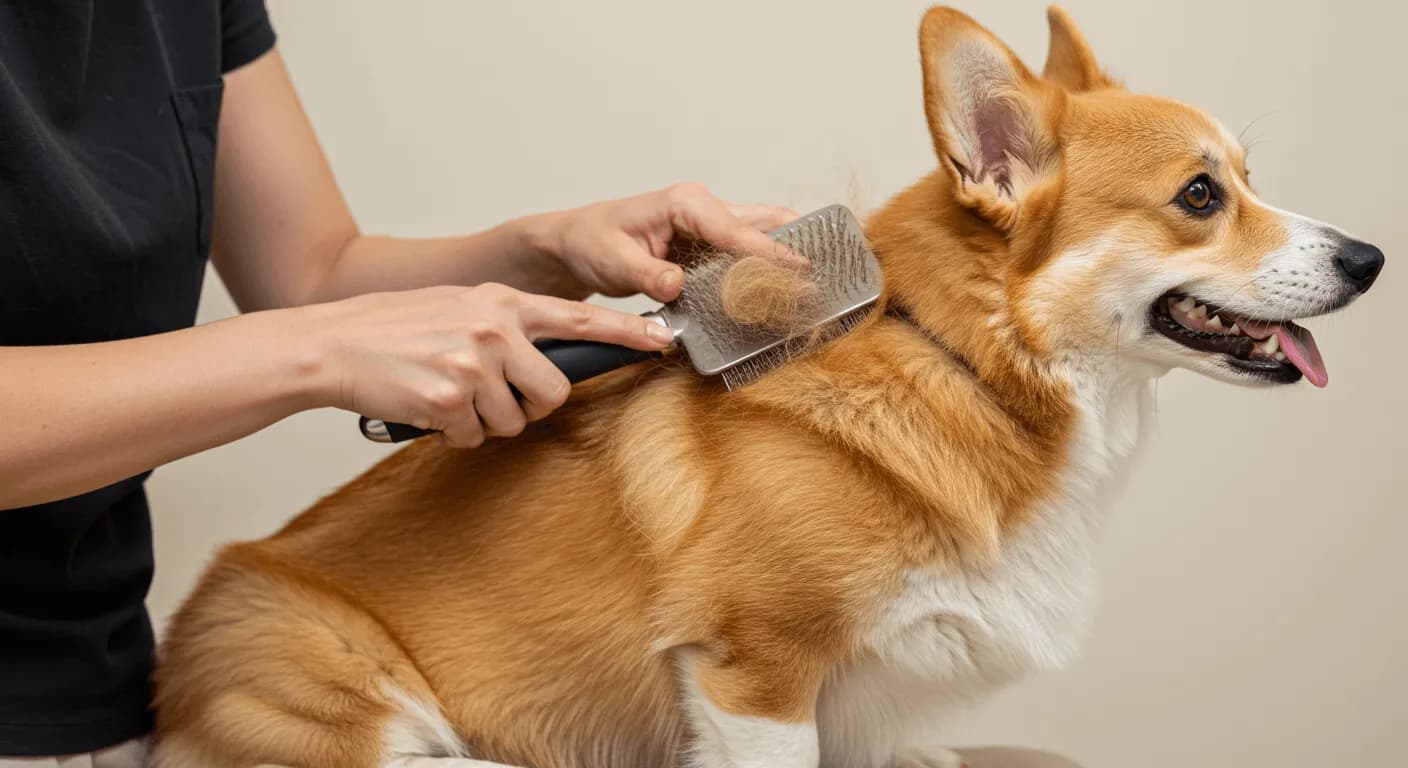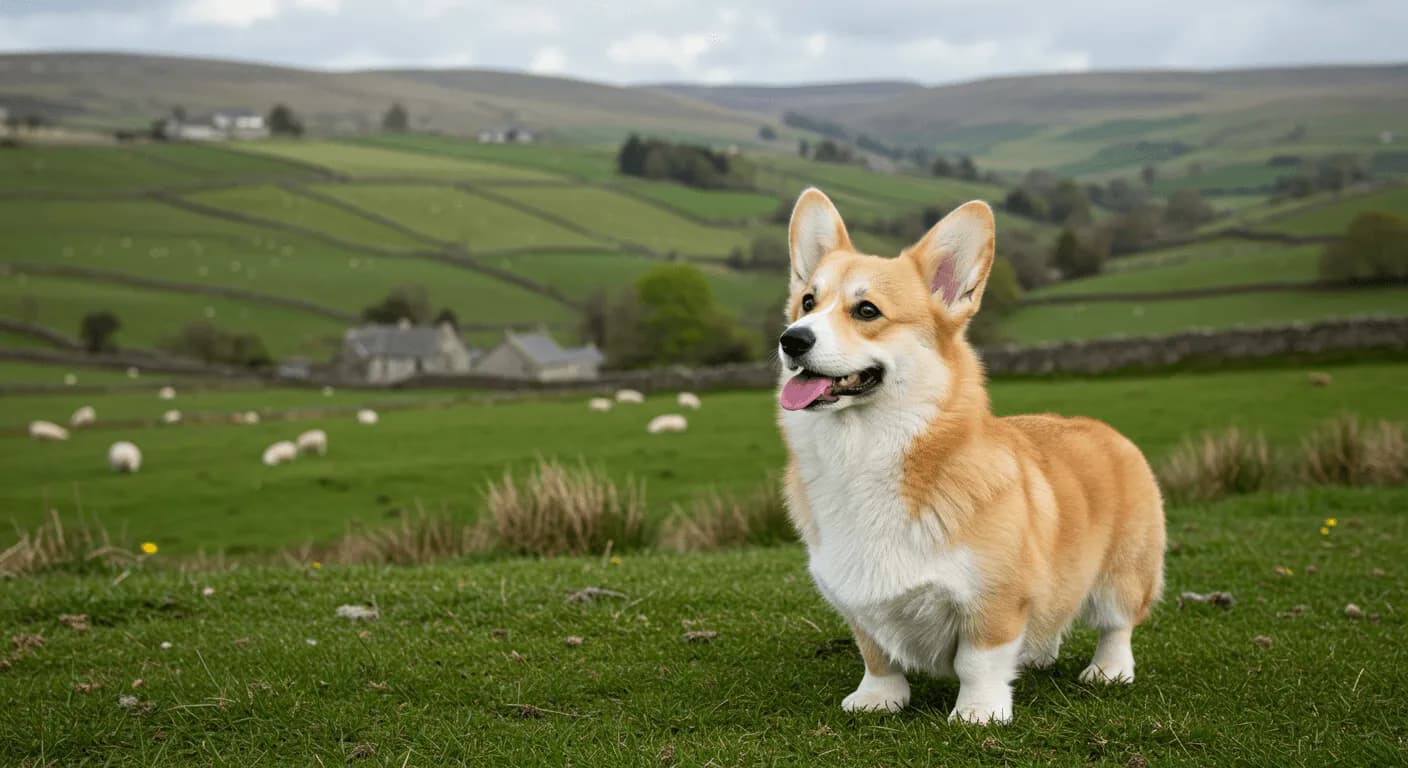The Pembroke Welsh Corgi is one of the most beloved dog breeds in the world, winning hearts with their fox-like faces, sturdy bodies, and distinctive short legs. These small but mighty herding dogs have become increasingly popular as family pets, and for good reason. Whether you've just welcomed a Corgi into your home or are considering adding one to your family, understanding their specific care requirements is essential for ensuring they live a happy, healthy life.
Originating from Wales, these dogs were bred as herding animals, tasked with driving cattle by nipping at their heels. This heritage has shaped much of their personality and physical traits. Despite their small stature, Pembroke Welsh Corgis are energetic, intelligent, and remarkably strong. Their working dog background means they require proper care tailored to their unique needs.
Many first-time Corgi owners might assume these small dogs need minimal exercise or can be treated as lap dogs. However, this misconception couldn't be further from the truth. Pembroke Welsh Corgis are working dogs with significant exercise requirements and mental stimulation needs. Another common misconception is that their cute appearance means they're easy to care for, but their double coat requires regular maintenance, and their herding instincts may need proper channeling.

Understanding the Pembroke Welsh Corgi's Temperament and Needs
Pembroke Welsh Corgis possess a delightful blend of personality traits that make them wonderful companions. They are known for being alert, intelligent, and affectionate while maintaining an independent streak characteristic of their herding background. These dogs form strong bonds with their families and are typically eager to please, making them responsive to training when approached with consistency and positive reinforcement.
Despite their small size, Corgis have big personalities. They tend to be outgoing and friendly, though they can be somewhat reserved with strangers at first. Many Corgi owners describe their pets as having a sense of humor and enjoyment of play. Their expressive faces and the famous "Corgi sploot" (when they stretch their legs out behind them) are just a couple of the endearing traits that have won them a dedicated following on social media.
When it comes to activity levels, don't let their short legs fool you. Pembroke Welsh Corgis are high-energy dogs that require significant daily exercise to remain healthy and happy. As herding dogs, they have impressive stamina and need both physical activity and mental challenges. Without adequate exercise, Corgis can become bored, which often leads to destructive behaviors or excessive barking.
For proper Corgi care, aim to provide at least 45-60 minutes of exercise daily, which can be divided into multiple sessions. Activities that work well for Corgis include:
- Brisk walks around the neighborhood
- Games of fetch in a fenced yard
- Agility training (which they often excel at)
- Structured playtime with puzzle toys
- Herding trials or classes if available in your area
Mental stimulation is equally important for this intelligent breed. Incorporating training sessions, puzzle toys, and new experiences into their routine helps keep their minds sharp and prevents boredom. Remember that a tired Corgi is generally a well-behaved Corgi, and meeting both their physical and mental exercise needs will contribute significantly to a harmonious household.
Their herding background also means that Pembroke Welsh Corgis can have a strong prey drive and may attempt to herd moving objects, including children, other pets, or even cars. This behavior should be managed through proper training from an early age. Redirecting herding behaviors toward appropriate outlets, such as structured herding activities or fetch games, can help satisfy this natural instinct.
Grooming and Hygiene Needs
The Pembroke Welsh Corgi's adorable appearance comes with specific grooming requirements. These dogs have a weather-resistant double coat consisting of a thick, soft undercoat and a longer, coarser outer coat. This double layer served an important purpose in their herding days, protecting them from the elements while working outdoors in varied Welsh weather conditions.
Corgis are moderate to heavy shedders year-round, with two major shedding periods annually. During these "blowout" periods, typically in spring and fall, they shed their undercoat in large quantities, often leaving tufts of fur around your home. Regular grooming is essential not only for controlling this shedding but also for maintaining the health of their skin and coat.
A comprehensive grooming routine for your Pembroke Welsh Corgi should include:
- Brushing 2-3 times per week normally, increasing to daily during heavy shedding seasons
- Bathing every 4-8 weeks, depending on activity level and coat condition
- Regular nail trimming every 3-4 weeks to prevent overgrowth and splitting
- Weekly dental care with dog-appropriate toothpaste to prevent periodontal disease
- Checking and cleaning ears weekly to prevent infection
- Occasional trimming of the fur between paw pads to improve traction
For brushing, a slicker brush followed by an undercoat rake works well for Corgis, especially during shedding season. Some owners find that using a deshedding tool like the Furminator helps manage the undercoat more effectively. When bathing your Corgi, use a dog-specific shampoo that won't strip the natural oils from their coat.

While Corgis don't typically need professional grooming as frequently as some other breeds might, many owners find that scheduling occasional professional sessions, especially during heavy shedding periods, can be beneficial. Professional groomers can help with thorough undercoat removal, nail trimming, and other grooming tasks that might be challenging at home.
It's worth noting that some Corgi owners mistakenly believe shaving their dog will reduce shedding or keep them cooler in hot weather. However, shaving a double-coated breed like the Pembroke Welsh Corgi is generally not recommended. Their double coat actually provides insulation against both cold and heat, and shaving can disrupt the natural growth pattern of the coat, potentially leading to issues with regrowth and removing their natural protection from the elements.
Health Concerns and Veterinary Care
Pembroke Welsh Corgis are generally robust dogs with a lifespan of 12-13 years, but like all breeds, they have specific health concerns that owners should be aware of. Proactive health management and regular veterinary care are essential components of responsible Corgi ownership.
Some of the common health issues seen in Pembroke Welsh Corgis include:
- Intervertebral Disc Disease (IVDD) - Due to their long back and short legs, Corgis are predisposed to spinal disc problems. Symptoms include reluctance to jump, pain when touched along the spine, and in severe cases, partial or complete paralysis.
- Hip Dysplasia - While more commonly associated with larger breeds, Corgis can suffer from this genetic condition affecting the hip joint.
- Progressive Retinal Atrophy (PRA) - A group of genetic diseases causing progressive vision loss and potentially blindness.
- Von Willebrand's Disease - A blood clotting disorder that can cause excessive bleeding after an injury or surgery.
- Degenerative Myelopathy - A progressive disease of the spinal cord that can lead to paralysis in older dogs.
- Obesity - Corgis have a tendency to gain weight easily, which can exacerbate other health problems, particularly those affecting their joints and spine.
Establishing a relationship with a veterinarian who is familiar with the breed is invaluable. Your Corgi should have regular check-ups, typically annual for young adults and semi-annual for seniors (7+ years). These visits allow for early detection of potential issues and management of age-related changes.
A comprehensive vaccination schedule, typically beginning at 6-8 weeks of age, is essential for protecting your Corgi from common canine diseases. Core vaccines usually include those for rabies, distemper, parvovirus, and adenovirus. Your veterinarian may recommend additional vaccines based on your geographical location and your dog's lifestyle.
Parasite prevention is another critical aspect of Corgi health care. Regular treatments for fleas, ticks, and heartworm are important preventative measures, as is routine deworming to control internal parasites. Your veterinarian can recommend the most appropriate products and schedule for your specific situation.
Weight management deserves special attention for Pembroke Welsh Corgis. Their body structure makes them prone to weight gain, which can put additional stress on their already challenged spine and joints. Maintaining a healthy weight through proper diet and exercise is one of the most important things you can do to prevent health problems in your Corgi. You should be able to feel (but not see) your Corgi's ribs, and they should have a visible waist when viewed from above.
For Corgi owners concerned about spinal health, there are several preventative measures worth considering:
- Discourage jumping on and off furniture
- Provide ramps or steps for accessing beds or couches
- Use harnesses instead of neck collars for walks to reduce strain on the neck and spine
- Maintain proper weight to reduce stress on the spine
- Consider joint supplements containing glucosamine and chondroitin (with veterinary approval)
Should a Pembroke Welsh Corgi's Ears Be Cropped?
When it comes to Pembroke Welsh Corgis, there's often confusion about ear cropping. It's important to clarify that traditional Pembroke Welsh Corgis do not undergo ear cropping - the procedure of surgically altering a dog's ears to make them stand erect. Pembroke Welsh Corgis naturally have erect, pointed ears that stand up on their own without any surgical intervention.
This is a key difference between Pembrokes and their close cousins, Cardigan Welsh Corgis, who also have naturally erect ears. The confusion may arise because some other dog breeds do commonly undergo ear cropping procedures, such as Doberman Pinschers, Great Danes, and Boxers.
Ear cropping is a surgical procedure typically performed when puppies are between 7 and 12 weeks old. The procedure involves cutting parts of the dog's naturally floppy ears to make them stand upright. After surgery, the ears are taped to a hard surface while they heal to "train" them to stand upright. This practice originated for various working purposes in different breeds, such as preventing ear injuries in hunting or fighting dogs.
In recent years, ear cropping has become increasingly controversial for several important reasons:
- It's considered a cosmetic procedure without medical benefits
- The surgery and recovery can be painful for puppies
- Many veterinary organizations oppose unnecessary cosmetic surgeries
- The procedure is banned in many countries as an unnecessary mutilation
The American Veterinary Medical Association (AVMA) opposes ear cropping when done solely for cosmetic reasons and encourages the elimination of ear cropping from breed standards. Many countries, including the United Kingdom, Australia, and most European nations, have banned ear cropping entirely.
For Pembroke Welsh Corgi owners, the good news is that this ethical dilemma isn't relevant to your pet care decisions, as the breed naturally displays the erect ears that contribute to their fox-like appearance. No surgical intervention is needed or appropriate for a Corgi's ears.
Instead of worrying about ear cropping, Corgi owners should focus on proper ear care, which includes:
- Regular checking for signs of infection, such as redness, swelling, or unusual odor
- Gentle cleaning of the outer ear with a veterinarian-approved cleaner
- Monitoring for excessive wax buildup
- Being attentive to any signs of ear discomfort, such as head shaking or ear scratching

Should a Pembroke Welsh Corgi's Tail Be Docked?
Unlike ear cropping, tail docking has historically been a common practice for Pembroke Welsh Corgis. Traditionally, Pembroke Welsh Corgis were born with tails that were then docked (surgically shortened) shortly after birth. This practice has been so widespread that many people don't realize Pembrokes naturally have tails, and the bobbed appearance has become part of the breed's recognized standard in some countries.
The history of tail docking in Pembroke Welsh Corgis has practical origins. As working herding dogs, there was concern that longer tails could be stepped on by cattle, causing injury to the dog. Additionally, in some countries, working dogs were historically taxed differently than companion animals, and tail docking served as a visual indicator of a dog's working status.
Today, the practice of tail docking is highly controversial and subject to varying regulations worldwide:
- In the United States, tail docking is still permitted and commonly practiced on Pembroke Welsh Corgi puppies. The American Kennel Club (AKC) breed standard describes the tail as "docked as short as possible without being indented."
- In the United Kingdom, tail docking was banned in 2007 except for certified working dogs or for medical reasons.
- In Australia and many European countries, tail docking is prohibited entirely as a cosmetic procedure.
The docking procedure typically occurs when puppies are between 2 and 5 days old, often without anesthesia based on the belief that a puppy's nervous system is not fully developed at this age. However, this assumption has been challenged by modern veterinary research, which suggests that puppies do indeed feel pain during the procedure.
The ethical considerations around tail docking include:
- Questions about unnecessary pain and stress
- Removal of a body part used for canine communication
- Potential impact on balance and movement
- Lack of medical necessity in most cases
It's worth noting that some Pembroke Welsh Corgis are born with naturally bobbed tails due to a genetic mutation. These dogs, sometimes called "natural bobtails," have shorter tails from birth without any surgical intervention. This trait affects approximately 20% of the breed.
For prospective Corgi owners concerned about this issue, there are several options:
- Seek out a breeder who doesn't practice tail docking
- Look for a Corgi born with a natural bobtail
- Consider adopting an adult Corgi from a rescue organization
The decision about whether to acquire a Pembroke Welsh Corgi with a docked tail, natural bobtail, or full tail ultimately depends on personal ethical considerations and the laws in your region. Regardless of tail length, proper care of the tail area includes keeping it clean and dry, and monitoring for any signs of irritation or infection.
Should a Pembroke Welsh Corgi Be Muzzled?
The question of whether Pembroke Welsh Corgis should be muzzled is one that might surprise many owners of this breed. Generally speaking, Pembroke Welsh Corgis are not a breed that requires routine muzzling in everyday situations. These dogs are typically friendly, social animals that don't display the level of aggression that might necessitate regular muzzle use.
However, there are specific circumstances where muzzling might be appropriate for a Corgi, just as it might be for any breed:
- During veterinary visits - Some Corgis may become anxious or fearful during examinations or procedures, potentially leading to defensive behavior. A temporary muzzle can provide safety for the veterinary staff.
- In stressful public situations - If your Corgi has shown anxiety or reactive behavior in crowded or overwhelming environments, a muzzle might be a temporary safety measure while you work on training.
- Following surgery or injury - To prevent a dog from licking or chewing at wounds or surgical sites, a muzzle might be used for short periods (though special cones or recovery suits are often better options for this purpose).
- During introduction to new animals - If you're unsure how your Corgi will react to a new pet, a basket muzzle might provide peace of mind during initial introductions.
- When required by law or regulations - Some areas have breed-neutral legislation requiring all dogs, regardless of breed, to be muzzled in certain public spaces like public transportation.
If muzzling becomes necessary for your Pembroke Welsh Corgi, it's important to choose the right type of muzzle and introduce it properly. Basket muzzles are generally the best option as they allow the dog to pant, drink, and take treats while preventing biting. Nylon muzzles that hold the mouth closed should only be used for very brief periods as they restrict normal cooling and breathing.
Proper muzzle introduction should follow these steps:
- Associate the muzzle with positive experiences by presenting it with treats
- Encourage your Corgi to touch the muzzle voluntarily to get rewards
- Gradually work up to having your dog put their nose in the muzzle for increasing periods
- Only secure the muzzle once your dog is comfortable with having it on their face
- Keep initial muzzled sessions very short and positive
- Never use a muzzle as punishment
It's worth emphasizing that while muzzles can be useful safety tools in specific circumstances, they are not solutions for underlying behavioral problems. If your Corgi displays concerning aggressive behavior, working with a professional dog trainer or veterinary behaviorist is essential to address the root causes.
For most Pembroke Welsh Corgi owners, muzzle training might be viewed as a precautionary skill - something your dog learns but rarely needs to use, similar to teaching emergency recalls or crate training. Even if you never plan to use a muzzle regularly, having a dog who accepts one calmly can be valuable in emergency situations.
Creating a Comfortable Living Environment
Creating an ideal living environment for your Pembroke Welsh Corgi is essential for their physical health, mental well-being, and overall quality of life. Despite their small size, Corgis are active, intelligent dogs that require thoughtful consideration of their living space.
First and foremost, it's important to understand that Pembroke Welsh Corgis are primarily indoor dogs who thrive on family interaction. While they enjoy outdoor activities, they should live inside the home with their human family members. Their short legs and double coat make them vulnerable to temperature extremes, so outdoor-only living is not appropriate for this breed.
When setting up your home for a Corgi, consider the following aspects:
- Flooring surfaces - Corgis can have difficulty with slippery surfaces like hardwood or tile floors due to their short legs. Consider providing runners or area rugs in high-traffic areas to give them better traction and reduce the risk of injury.
- Furniture access - Due to their long backs and short legs, jumping on and off furniture can put strain on a Corgi's spine. Provide ramps or steps to beds and couches if you allow your Corgi on furniture, or train them to wait for assistance.
- Temperature control - While their double coat provides some insulation, Corgis can struggle in extreme temperatures. Ensure your home has adequate heating in winter and cooling in summer. Be particularly cautious during hot weather, as these dogs can overheat quickly.
- Secure fencing - If you have a yard, ensure it's securely fenced with no gaps or holes through which an enterprising Corgi might escape. These intelligent dogs can be surprisingly resourceful when motivated to explore.
- Exercise space - While a large yard isn't absolutely necessary, Corgis do benefit from having some space to run and play. If you live in an apartment or have a small yard, plan for regular visits to dog parks or similar spaces.
When it comes to setting up dedicated areas for your Corgi within your home, consider these essentials:
- Sleeping area - Provide a comfortable bed in a quiet location where your Corgi can rest undisturbed. Many Corgis prefer beds with bolsters or raised edges that they can lean against.
- Feeding station - Create a consistent place for meals, ideally on an easy-to-clean surface. Some Corgis benefit from elevated feeding stations that reduce strain on their neck and back.
- Toy storage - Keeping a variety of toys available helps prevent boredom. Rotate toys regularly to maintain interest.
- Training area - Designate a distraction-free zone for training sessions, which are essential for this intelligent breed.
Selecting appropriate toys is another important aspect of creating a good environment for your Corgi. These intelligent dogs need both physical and mental stimulation. Good choices include:
- Interactive puzzle toys that dispense treats
- Durable chew toys appropriate for their strong jaws
- Herding balls that satisfy their instinctual drives
- Plush toys for carrying and "mothering" (many Corgis enjoy this)
- Tug toys for interactive play (great for burning energy indoors)
Safety-proofing your home is particularly important with Pembroke Welsh Corgis, who are curious and food-motivated. Keep toxic foods, medications, and household chemicals well out of reach. Their short stature means they may not counter-surf like taller dogs, but they're resourceful and determined when motivated by food!
Finally, consider creating spaces that allow your Corgi to engage in natural behaviors. A window perch where they can watch outdoor activity or a designated digging area in the yard (if digging is an issue) can help satisfy natural instincts in appropriate ways.
Socialization and Family Compatibility
Pembroke Welsh Corgis have earned their reputation as excellent family dogs, but successful integration into family life requires proper socialization and understanding of their natural tendencies. Early and ongoing socialization is crucial for developing a well-adjusted, confident Corgi who interacts appropriately with family members, strangers, and other animals.
When it comes to children, Corgis can make wonderful companions with the right approach. They're typically playful, affectionate, and protective of "their" kids. However, there are important considerations:
- Their herding background may lead them to nip at the heels of running children
- They can be protective and may need careful introduction to children's friends
- Their sturdy build makes them more tolerant of handling than some small breeds, but children should still be taught appropriate interaction
For families with young children, supervision is essential during interactions, and both the child and dog should be taught how to respect each other's boundaries. Teaching children not to run screaming around the Corgi (which can trigger herding behavior) and showing them how to pet gently are important steps.
Regarding other pets, Pembroke Welsh Corgis generally coexist well with other animals when properly introduced. Their herding instincts may initially cause them to try to "manage" other pets, but with time and proper training, they typically adjust well to multi-pet households. When introducing a Corgi to existing pets:
- Make introductions in neutral territory when possible
- Keep all animals on leashes or otherwise controlled during initial meetings
- Provide separate feeding areas to prevent resource guarding
- Give each pet their own "safe space" where they can retreat if needed
- Supervise all interactions until you're confident of their compatibility
With strangers, Corgis tend to be naturally alert and somewhat reserved initially, though rarely aggressive without reason. Their herding heritage makes them excellent watchdogs who will alert you to visitors or unusual activity. Most Corgis warm up quickly to welcomed guests once they understand the person is accepted by their family.
A comprehensive socialization plan for your Pembroke Welsh Corgi should begin in puppyhood (if possible) and include exposure to:
- Different types of people (varying ages, genders, appearances)
- Various environments (urban areas, parks, stores that allow dogs)
- Different surfaces (grass, carpet, tile, gravel, wood)
- Various sounds (traffic, appliances, children playing)
- Other animals (both dogs and non-canine pets)
- Handling of all body parts (paws, ears, mouth) to prepare for grooming and veterinary care
For Corgis who didn't receive adequate socialization early in life, all is not lost. Adult dogs can still benefit from carefully planned, positive exposure to new experiences. The key is to go slowly, use plenty of rewards, and never force interactions that cause fear or stress.
Training plays a vital role in family compatibility as well. Corgis are intelligent and highly trainable, but they can also be independent thinkers with a stubborn streak. Consistent, positive reinforcement-based training is essential for developing good manners. Basic obedience commands like "leave it," "stay," and a reliable recall can prevent many common behavioral issues.
Special consideration should be given to managing their herding instincts in a family setting. These behaviors can include:
- Nipping at heels during active play
- "Bumping" people to move them in a certain direction
- Barking to control movement
- Circling and gathering family members together
Rather than punishing these natural behaviors, it's more effective to redirect them to appropriate outlets. Structured activities like agility, flyball, or actual herding trials can provide healthy expression of these instincts. Even games like fetch or frisbee can help satisfy the need to chase and control movement.
Conclusion
Caring for a Pembroke Welsh Corgi requires dedication, understanding, and a commitment to meeting their specific needs. These charming, intelligent dogs bring immense joy to their families, but they flourish when their care is tailored to their unique physical structure, temperament, and herding background.
The key elements of successful Corgi care include proper exercise, consistent training, regular grooming, attentive healthcare, and thoughtful socialization. By addressing each of these areas, you'll help ensure your Corgi lives a healthy, balanced life as a cherished family member.
Remember that while Corgis are adaptable dogs who can thrive in various living situations, they do have non-negotiable needs: regular physical activity, mental stimulation, and close interaction with their human family. Their working dog heritage means they're happiest when given jobs to do and ways to exercise both body and mind.
Whether you're considering adding a Pembroke Welsh Corgi to your family or looking to enhance the care of your current Corgi companion, understanding these fundamentals will set you both up for success. With their fox-like faces, distinctive profile, and big personalities packed into small bodies, Corgis offer a unique and rewarding relationship to owners willing to invest in their specific care.
The effort you put into properly caring for your Pembroke Welsh Corgi will be returned many times over in loyalty, affection, and the special joy that comes from sharing your life with these remarkable dogs. As the saying goes in Corgi circles, they may be short of leg, but they're never short on love.




